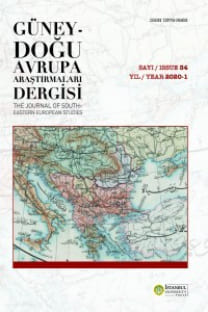“Balkan Laneti: I. Dünya Savaşı Öncesinde Itilaf Devletlerinin Gözünde Avusturya-Macaristan’ın Politikası”
Avusturya-Macaristan, Sırbistan, Rusya, Fransa, Birleşik Krallık, Balkanlar, İtilaf, Üçlü İttifak, Güney Slavları Sorunu
THE BALKAN CURSE: AUSTRIA-HUNGARY’S POLICY IN THE VIEW OF THE ENTENTE POWERS ON THE EVE OF WORLD WAR I
Austria-Hungary, Serbia, Russia, France, Great Britain, Balkans, Entente, Triple Alliance, Southern Slav question,
___
- Archives
- Arkhiv vneshnei politiki Rossiiskoi imperii, Moscow, Russia.
- Gosudarstvennyi arkhiv Rossiiskoi Federatsii, Moscow, Russia.
- Rossiiskii Gosudarstvennyi voenno-istoricheskii arkhiv, Moscow, Russia.
- The National Archives, Kew, UK.
- Published sources and literature
- A. J. P. Taylor, The Habsburg Monarchy, 1809-1918: A History of the Austrian Empire and Austria-Hungary, London: Hatmish Hamilton, 1948.
- Alfred Dumaine, Dernière Ambassade de France en Autriche. Notes et souvenirs, Paris : Impr.-libr.-éditeurs Plon-Nourrit et Cie, 1921.
- B. A. Shaposhnikov, Mozg armii, vol. 1, Moscow, Leningrad: Gosudarstvennoe izdatel’stvo. Otdel voennoi literaturi, 1927.
- British Documents on the Origins of the War 1898 -1914, vol. 9 (2). London, 1934.
- G. L. Niox, Géographie militaire. Autriche-Hongrie et péninsule des Balkans, Paris: L. Baudoin, 1887.
- H.W. Steed, The Hapsburg Monarchy, London: Constable and Company Ltd., 1914.
- L. M. Vasilevsky, Avstro-Vengriia. Politicheskii stroi i natsionalnie voprosy, Saint-Petersburg, 1906.
- O.I. Aganson, ‘Global’noe videnie lokal’noi problem: podhodi Velikobritanii k uregulirovaniiu albanskogo voprosa v nachale 20 veka’, in Nezavisimost’ Albanii v obshebalkanskom kontekste. K 100-letiiu obrazovaniia Albanskogo gosudarstva, Moscow: Institut slavianovedeniia RAN, 2014.
- Oscar Jászi, The Dissolution of the Habsburg Monarchy, Chicago: Chicago University Press, 1929.
- P. A. Iskenderov, Serbia, Tchernogoriia i Albanskii vopros v nachale 20 veka, Saint-Petersburg: Aleteia, 2013.
- R. Pinon, ‘L’Autriche et la guerre balkanique’, Revue des deux mondes : recueil de la politique, de l’administration et des mœurs, période 6, t. 13.
- R. W. Seton-Watson, Racial Problems in Hungary, London: Archibald Constable and Co Ltd., 1908.
- R.W Seton-Watson, Die Zukunft Österreich-Ungarns und die Haltung der Grossmächte, Leipzig : Franz Deuticke, 1908.
- R.W. Seton-Watson, ‘New Phases of the Balkan Question,’ The Contemporary Review, vol. 104, 1913.
- R.W. Seton-Watson, The Southern Slav Question and the Habsburg Monarchy, New York: Fertig, 1969.
- R.Y. Crampton, The Hollow Détente: Anglo-German Relations in the Balkans 1911-1914, London: Prior, 1980.
- ISSN: 0378-3863
- Başlangıç: 1974
- Yayıncı: İstanbul Üniversitesi
BIRINCI ALEKSANDR VE 1821 RUM AYAKLANMASI’NIN BIRINCI AŞAMASI
13.yüzyılın İkinci Yarısında Transilvanya: Cemaat Sisteminin Yükselişi
RUSYA-TÜRKIYE SINIR KAVRAMI (1696-1829)
Atinalı Politikacıların Bizans Rüyası (XIX-XX. Yüzyıllar)
Manastır Vilayeti’nde Makedon MilliKurtuluş Hareketi (1893-1903)
Doğu Sorunu ve 1850’lerin Sonu-1870’lerin Başında Rus Toplumu
